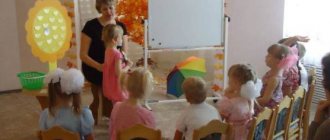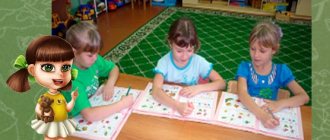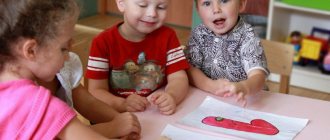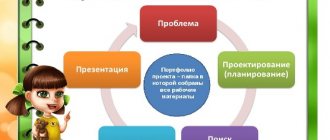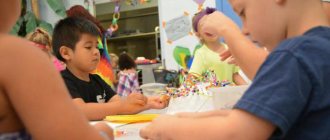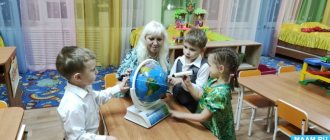Implementation of the regional component through project activities in preschool educational institutions
PROJECT “MY SMALL HOMELAND”
Authors: Paigamova Marina Kadiralievna, Sorokina Svetlana Aleksandrovna
Position: teachers of municipal educational institution kindergarten No. 23 in Volgograd
annotation
The “My Small Motherland” project helps solve issues of moral and patriotic education by instilling in preschoolers love for the Motherland, the first and important step of which is nurturing love for loved ones - family, home, hometown. A child, first of all, needs to recognize himself as a member of the family, part of a small homeland, and only then as a citizen of his large and vast homeland. This development reveals the features of organizing various types of children's activities, forms of work with project participants that promote the active involvement of parents in joint activities with the child in a kindergarten and family. The project is addressed to preschool teachers and specialists.
Ι. Introduction
At the present stage, the basis of the education system is the federal state educational standard for preschool education. One of the main principles of preschool education is to familiarize children with sociocultural norms, traditions of the family, society and state, taking into account the ethnocultural situation of children's development.
The education of patriotic feelings must begin from preschool age, because it is at this stage that the child’s personality is formed. But patriotic feeling does not arise on its own. This is the result of long-term, targeted exposure that begins in childhood. You cannot be a patriot without feeling a personal connection with your homeland. Modern preschoolers often do not feel proud of their homeland. In many families, issues of patriotic education are not considered important; parents pay less and less attention to their children. It is increasingly difficult for a child to love his home, family, city. Forming love for Russia in children must begin with the understanding that their family, home, hometown is part of a big country. From our native corner of the earth begins the huge country of Russia, of which we are all citizens. At the same time, it is necessary to create conditions for the formation of an emotionally rich image of home, kindergarten, and hometown in students. Children must learn not only to take, but also from childhood to give care for loved ones, attention to each other, help in word and deed.
One of the main means of moral and patriotic education is the project method, which develops cognitive interest in various fields of knowledge, develops cooperation skills, and opens up great opportunities in organizing joint research activities of preschoolers, teachers and parents.
ΙΙ. Features of the implementation of the project “My Small Motherland”
Project name: “My small homeland”
Authors of the project: Paigamova M.K., Sorokina S.A.
Implementation period: 04/15/2019-04/28/2019
Project participants: secondary group students, teachers and parents of the group.
Project implementation location: Municipal educational institution "Kindergarten No. 23 of the Dzerzhinsky district of Volgograd"
Type of project: educational, informational and creative, children and adults, group, short-term.
The goal and result of the project: instilling pride in one’s small homeland, respect for the history of one’s hometown and its cultural values.
Tasks:
formation of a sense of attachment to home, family, loved ones, friends, kindergarten; creating an emotionally healthy atmosphere;
formation of the concept of “small homeland”;
the formation of primary ideas about Volgograd: its history, symbolism, attractions;
developing students’ cognitive interest in the history and culture of their city, developing a sense of pride and a desire to preserve its beauty;
development of creative abilities, imagination, thinking, speech;
increasing the pedagogical competence of parents in moral and patriotic education;
activating the creative potential of students and parents through involvement in project activities.
Relevance of the project
One of the foundations of moral and patriotic education, its first and most important stage is the cultivation of love for family, home, small homeland. The child must first recognize himself as a member of the family, then an integral part of his small homeland, and only then a citizen of Russia. You need to start cultivating love for the Motherland with small things: love for the people closest to you, for the place where you were born and raised, awareness of the beauty of your native land.
Problem: How to develop an interest in the history of your hometown and the sights of your small homeland?
Types of activities: communicative, cognitive, productive, playful, motor, reading fiction.
Project support: laptop, projector, family photos, a selection of illustrations and photographs on the history of the city of Volgograd, works of art on the topic, materials for children’s creative activities.
Expected result: developing in pupils an interest in their family, the history of their hometown, its attractions, involving parents in the life of the group and kindergarten.
Product of project activities: albums “My Family”, “My Small Homeland”.
Project implementation stages
Ι Preparatory stage
Identifying the problem, setting goals, defining project objectives.
Selection of methodological literature, drawing up an action plan for the implementation of the project.
Selection of visual, didactic and photographic materials, fiction.
Monitoring children’s knowledge at the initial stage of the project on the topics “What is a “small homeland””, “What do I know about Volgograd”.
Organization of a developmental environment in the group, replenishment with illustrations, local history and photographic material on the topic of the project.
Discussion of the project with parents.
Preparation of consultations for parents on the project “Family and Family Values”, “Moral and Patriotic Education of Preschool Children”, “History of the Origin of Volgograd”, “Raising a Citizen”, recommendations to parents “How to Raise a Patriot”, on visiting the sights of their hometown together with their children, memorable places.
ΙΙ Main stage
| No. | Main activities | Events | Tasks |
| Ι week “My family, my kindergarten” | |||
| 1. | Cognitive activity | 1. Conversation “My home is my fortress” | Cultivate a friendly attitude towards family and friends, explain the meaning of the phrase “My home is my fortress”, consolidate ideas about family members and family relationships. |
| 2. Conversations “My family”, “Whose street is this, whose house is this?”, “I love my street”, “Why I love kindergarten”, “Who works in kindergarten”, “Professions of my parents” | To form the concept of “small homeland”, expand vocabulary, develop observation, speech, memory. | ||
| 3.Observation of “Houses around” | Enrich children's understanding of the world around them. | ||
| 4. Excursions around the kindergarten, along the street on which the kindergarten is located | Clarify ideas about the kindergarten, its location, and develop the ability to talk about what they see. | ||
| 5. Review of the albums “My Family”, “My Group”, “Professions” | Strengthen ideas about the concept of “family”, family relationships, and form friendly relationships with peers. | ||
| 6.D/i “Whose baby”, “Who lives here”, “How we live in kindergarten”, “Find objects” | Form and clarify ideas about the world around you. | ||
| 2. | Communication activities | 1. Compilation of stories “Who do I live with”, “It’s good in our garden”, “Why I love kindergarten”, “My best friend”, “What I like to do in kindergarten and at home”, “What I want be”, “How I help at home”, “What do my parents do” | Develop coherent speech, its grammatical structure, the ability to answer questions, cultivate emotional responsiveness, and attentive attitude towards others. |
| 2.Reading proverbs and sayings about family | Help to remember and understand the meaning and content of proverbs and sayings on the topic. | ||
| 3.Reading S. Kaputikyan “My Grandmother”, R. Gamzatov “My Grandfather”, Y. Yakovlev “Mother”, N. Nosov “Patch”, S. Marshak “About Boys and Girls”, K. Ushinsky “Together Closely, it’s boring apart”, V. Berestov “We are driving around the city”, S. Mikhalkov “The street of our city” | To generate interest and need for reading on the topic, to develop artistic perception of the texts of works. | ||
| 4. Memorization of poems by E. Uspensky “If I were a girl”, L. Kvitko “Grandma’s Hands”, E. Blaginina “That’s So Mom” | Help to remember poems, develop expressive speech, interest in fiction. | ||
| 5. D/i “I’m growing”, “Call me affectionately” | Develop speech, activate vocabulary, clarify ideas about the world around you. | ||
| 6.Riddles on the theme “Family”, “Kindergarten” | Develop an interest in solving riddles. | ||
| 3. | Play activity | 1. Role-playing games “Family”, “Kindergarten”, “Home”, “Birthday” | Develop communication skills, enrich children's social experience, and develop dialogic speech skills. |
| 2.D/i “On the streets of the city”, “Who lives where”, “Big and small”, “How we live in kindergarten”, “Club”, “Who needs what for work” | Form, clarify and systematize ideas about the world around you. | ||
| 4. | Productive activity | 1.Drawing “The House Where I Live” | Encourage children to draw the house in which they live to develop artistic abilities. |
| 2. Application “Multi-storey building”, “Transport on city streets” | Develop the ability to convey your impressions in productive activities. | ||
| 3.Construction of “The house where I live”, “Houses on our street”, “Our kindergarten” | Develop an interest in design, improve design skills, and practice creating buildings according to plan. | ||
| 5. | Interaction with parents | 1.Creation of albums “My Family”, “Family Traditions” | Involve parents in joint activities with their children to create albums. |
| 2.Consultation “Family and family values” | To form in parents an idea of family values in modern families, to create the prerequisites for the formation of an attitude towards family as one of the main values. | ||
| ΙΙ week “My hometown” | |||
| 1. | Cognitive activity | 1. Review of materials on the history of your hometown, illustrations of attractions, and memorable places. | Foster pride in the city's heroic past. |
| 2. Conversation “What do I know about my city” | Expand existing ideas about your hometown. | ||
| 3. Direct educational activities “Streets of the Hometown” | Clarify and consolidate ideas about your hometown, develop coherent speech. | ||
| 4.Viewing presentations “Travel around the city of Volgograd”, “Memorable places of our city” | Expand existing ideas, cultivate pride in your small homeland. | ||
| 2. | Communication activities | 1. Compilation of stories “Where I like to go”, “The most beautiful place in my hometown” | Develop coherent speech, its grammatical structure, the ability to answer questions, cultivate emotional responsiveness, and attentive attitude to the environment. |
| 2.Reading poems about Volgograd, E. Blaginin’s “Motherland” | Introduce literary works on the topic of the project, broaden your horizons. | ||
| 3.Reading proverbs and sayings about the Motherland | Help to remember and understand the meaning and content of proverbs and sayings on the topic. | ||
| 3. | Play activity | Role-playing games “Excursion”, “Trip around the city” | Develop communication skills, enrich children's social experience, and develop dialogic speech skills. |
| 4. | Productive activity | 1. Participation in the regional competition “Russia – My Motherland” | To develop the creative activity of pupils. |
| 2. Help in designing the album “My Small Homeland” | To develop interest in joint creative activities and enrich the social experience of children. | ||
| 5. | Interaction with parents | 1. Photo session “We are walking through the city”, creation of a photo album “My favorite city is Volgograd”, assistance in creating the album “My Small Motherland” | Involving parents in the life of the group and kindergarten, in joint activities with children in selecting photos and poetic material for album design. |
| 2.Parents meeting “A citizen is raised from childhood.” Presentation of the project and album “My Small Motherland” | Involve parents in discussing issues of patriotic education of preschoolers. |
ΙΙΙ Final stage
1.Monitoring children’s knowledge at the final stage of the project.
2.Formulation and analysis of project results.
3. Project presentation
ΙΙΙ. Conclusion
The project showed that the activities organized in the group contributed to the achievement of the set goal. The pupils had formed and systematized ideas about the family as an integral part of their small homeland, about their hometown. Getting to know the history of the city contributed to instilling pride and respect for its cultural values. Children have developed an interest in further study of the topic
The participation of parents in the project contributed to the activation of their creative potential through involvement in project activities.
The knowledge acquired by children during the implementation of the project will be the basis for the project “My Motherland – Russia” in the coming school year.
ΙV. List of used literature
Veraksa N.E., Komarova T.S., Vasilyeva M.A. From birth to school. Approximate general educational program for preschool education, M, 2015.
Veraksa N.E., Veraksa A.N. Project activities for preschoolers, M, 2016.
Dybina O.V. Familiarization with the subject and social environment, M, 2016.
Krasnoshchekova N.V. Role-playing games. Rostov-on-Don, 2014
Internet resources
Makhaneva M.D. Moral and patriotic education of preschool children. M, 2-14y.
Petrova V.I., Stulnik T.D. Moral education in kindergarten. Program and methodological recommendations in kindergarten. M, 2016
Sertakova N.M., Kuldashova N.V. Patriotic education of children 4-7 years old based on design and research activities. 2019
MAGAZINE Preschooler.RF
Generalization of work experience “System of work for the implementation of the regional component in a preschool educational organization”Author: Nina Pavlovna Arbekova, Senior teacher, MADOU kindergarten “Buratino”, Prudy village
The relevance of the topic on which I have been working for several years lies in the fact that the implementation of the regional component is an integral component of the patriotic, civic, moral education of the younger generation.
Its importance is emphasized in the special program “Patriotic education of citizens of the Russian Federation for 2016-2020” , approved by the Government of the Russian Federation. The program, aimed at different age groups, determines the main ways of developing the system of patriotic education and substantiates its content in modern conditions. A special place in the program is given to instilling patriotism in the younger generation.
The Federal Law “On Education in the Russian Federation” in Article 3, paragraphs 3 and 4 states that state policy is based on the principles of citizenship, patriotism, protection and development of ethnocultural characteristics and traditions of the peoples of the Russian Federation.
The “NATIONAL DOCTRINE OF EDUCATION IN THE RUSSIAN FEDERATION” (until 2025), recognizing the leading role of the teacher in achieving the goals of education, speaks of attracting talented specialists into the education system who are capable of carrying out the educational process at a high level, mastering new technologies, information systems, and instilling in students spirituality and morality.
The Federal State Educational Standard for Educational Education approves the principles of introducing children to sociocultural norms, traditions of the family, society, state and taking into account the ethnocultural situation of the child’s development.
The regional component is the past and present of the region, historical, cultural and natural features, customs, labor achievements, culture of interethnic relations. This is the very heritage that we must protect, develop and distribute among our descendants.
Considering this issue to be the most pressing, it was decided to organize work in this direction.
I would like to note the contradictions that are still unresolved in this area:
- between increased demands on the work of teachers and the unpreparedness to meet these expectations of society due to the insufficiency of scientific, methodological (there is no coherent methodological system that reflects the fullness of this issue) and technological support for their activities;
- between the preservation of traditional approaches to the management of methodological work in preschool educational institutions and the dissatisfaction of teachers with outdated forms, methods, and content of methodological work
The professional position of the senior educator in relation to teachers during work is determined by an individually oriented approach in organizing methodological work, namely:
The principle of the “zone of proximal development” (founded by L.S. Vygotsky for teaching children). The “zone of proximal professional development” is the zone in which the teacher, with the help of his colleagues, scientists, and the literature being studied, can resolve problems that have arisen in professional activities. At the same time, the “zone of proximal professional development” is purely individual for each teacher.
The principle of combining individual and group forms of methodological work assumes that each teacher can team up with other teachers or join the work of specially organized groups.
The principle of stimulating the creative growth of teachers on the basis of a developed system of moral and material incentives requires the creation of conditions for the formation of motivation for professional self-improvement. Among the motives, the following can be distinguished: motives for success, overcoming professional difficulties, aimed at improving material well-being, professional recognition, career motives, etc.
The principle of continuity and continuity provides for the constant professional growth of teachers and professional readiness for the implementation of the Federal State Educational Standard.
The main goal of my pedagogical activity in this area: Creation of an effective system of work for the implementation of the regional component in a preschool educational organization.
The main objectives are:
- Increasing the competence of teachers in terms of introducing the regional component into the educational process of preschool educational institutions
- Designing a system of work aimed at the professional development of teachers in the direction of introducing modern pedagogical technologies
- Motivation of preschool teachers to enrich and saturate preschool educational teaching staff in the regional component
- Organization of effective interaction between preschool
- educational institution with parents and society
This topic was implemented within the framework of a long-term project “My small homeland - the village of Prudy” , designed for a period of 3 years and including the following stages of work:
1. Organizational (May 2015 - September 2015)
- analysis of the conditions available at the MADU for the implementation of the regional component (personnel conditions, PPRS, interaction with society, etc.)
- development of a regulatory framework
2. Implementation (October 2015 – May 2022)
- increasing the professional competence of teachers in the field of application of modern educational technologies in the implementation of the regional component
- enrichment of PPRS
- organizing interaction with parents and social partners in this area.
3. Optimization (May 2022 – August 2022)
- analyze the results
- summarize the experience of teachers
- determining the prospects for further work on the topic, taking into account the results obtained.
At the organizational stage, an analysis of the conditions for the implementation of the regional component was carried out. Based on the results of this analysis, “weaknesses” , namely:
- Insufficient amount of visual and didactic material on moral and patriotic education
- Teachers do not use modern forms and methods of working with parents;
- There is no unified system of interaction with social partners (school, library).
- 65% of teachers experience difficulties in organizing a subject-development environment, selecting demonstration material, and didactic games for patriotic education;
- 25% experience difficulties in designing and planning work in this area with children;
- 45% of teachers experience difficulties in using ICT and project activities in the educational process.
Based on the results obtained, a system of work was developed in the following main areas:
Direction 1: Development of a plan for methodological support of teachers to improve professional competence in this area.
The work of a creative group was organized to introduce the regional component:
- Analysis and determination of software and methodological support for the implementation of the regional component in the educational process of preschool educational institutions;
- Development of a variable part of the OOP for the implementation of the regional component;
- Determination of forms and methods of working with children;
- Development of thematic blocks that are presented in an age aspect.
- Definition of targets.
As part of the methodological support of teachers to improve their professional competence, the work of the “Pedagogical Excellence” .
When working with teachers, round tables were organized:
- At the round table “My Small Motherland,” teachers got acquainted with the variable part of the program, its goals, objectives, conceptual framework, and target guidelines.
- Round table “Organization of RPPS for moral and patriotic education” , at which the experience of organizing RPPS of other kindergartens was studied, recommendations for organization were given.
Within the framework of this club, a permanent workshop “Application of modern educational technologies in the implementation of the regional component” :
At workshops, teachers were introduced to the experience of using ICT, project activities with children and parents in the regional component of other preschool educational institutions; organized practical classes on creating an ESM.
A master class was also held on the creation and use of electronic educational resources in educational activities; using the example of a self-developed electronic educational resource called “Your Choice,” demonstrated the stages of creating an electronic educational resource and conducted this interactive game with teachers.
The most effective forms of work are:
Mentoring is the most favorable form of work with teachers, which is aimed at understanding one’s own teaching experience and its creative processing.
Individual consultation.
The organization has already become a tradition:
- “Weeks of Pedagogical Excellence” : during which teachers show open events for preschool and district teachers, share impressions of their work, and take lessons for further work.
- “Project Fair” : at which teachers present their work experience on completed projects within the regional component.
2nd direction of work: Organization of activities to enrich the preschool educational educational system for moral and patriotic education.
In this area, 2 events were organized and held:
- Review-competition of centers of local history and patriotic education “We live in Russia”
The objectives of the competition are:
- Acquaintance with the history of the village and native land, country.
- Promoting the development of preschoolers' cognitive interests, horizons, and search activities.
- Instilling in preschoolers a sense of patriotism, pride, love and respect for their native land and country.
- Encourage teachers participating in the competition to conduct local history research, read local history literature, and visit expositions, exhibitions, and museums that present bright pages of the history of our region.
- Revealing the creative abilities of teachers when designing corners on local history, when using new forms of work with preschoolers.
Thanks to this review-competition in MADOU groups, centers of local history and patriotic education were enriched with a variety of material that corresponds to the age of children and the requirements of the program: state symbols, sights of our village, district, region, country, albums about national holidays, models of the village, illustrations, didactic games, maps, photographs, booklets, sets of postcards, local history and fiction, mobile folders, drawings and crafts by children on local history topics, etc.
- Organization of the mini-museum “Russian Izba” , which began to function in September 2022. Through the joint efforts of teachers and parents of students, this museum appeared in our MADOU. Since our kindergarten is located at a territorial distance from the regional center, many families of pupils live in the private sector, they found many items that are suitable for our mini museum “Russian Izba” . So the following exhibits appeared in our museum: a Russian stove, a sideboard, a table, benches, a grip, cast iron pots, a jug, a pot, etc.
Our museum is permanent, but it is “dynamic” , “transformable” . A schedule of responsible teachers and topics of expositions have been drawn up for the year, i.e. at a certain time, the mini-museum has a responsible teacher who arranges an exhibition within the museum, according to its theme, and monitors the order and cleanliness of the museum. So, starting from September 2022, exhibitions were organized on the following topics: “Household Utensils” , “Doll Workshop” , “Samovars” .
Our mini-museum occupies a small space and does not meet the strict requirements of a real museum. In its exhibition there is a lot made by the hands of educators, parents and children.
3rd direction of work: Organization of interaction with parents. An important condition for the effective implementation of local history education for preschoolers is, in our opinion, a close relationship with the families of the students. It is necessary that the process of nurturing love for one’s small homeland be two-way.
In our kindergarten, both traditional forms of cooperation with the family and modern ones are implemented, such as: organizing project activities together with parents: projects: “Coat of Arms of our Village” , “My Family” , “My Pedigree” , “Coat of Arms of My Family” , "Chronicle of Military Glory" . Parents, together with their children, prepare material for projects and present it to the group’s students.
At group events, teachers actively use ICT: interactive games, quizzes, presentations, videos.
Parents willingly supported the idea of creating the “Alumni Alley” . Every year, parents and their children plant seedlings around the perimeter of the preschool.
Parents and children take part in regional, interregional, and federal competitions: in 2022, 7 families took part in the Alexander Nevsky through social media. network “VKontakte” and other competitions.
4th direction of work: Organization of interaction with social partners.
Within the framework of this direction, joint planning of activities with our closest partners has become an annual event: the rural library, school, and House of Culture. We thought through the planning of joint events: with the school: educational excursions to the school, conversations with a primary school teacher, holding events, open classes and lessons; with the library: thematic meetings, quizzes, exhibitions of drawings in the library, in 2016 -2017 the joint project “Bread for everyone” (school preparatory group); with the House of Culture - it was planned to jointly organize concerts “May 9” , “Village Day” , etc.
Relations have also been established with the institutions of the village: a farm, a bakery, a coat house, and the Chistye Prudy .
A new direction has been introduced - introducing preschoolers to interesting people of the village: folk craftsmen, the oldest resident of the village, eyewitnesses of the war, farmers, etc.
Based on the results of all the work carried out, it can be noted that significant changes have occurred in the organization of educational activities with students in the regional component, and the efficiency of the work carried out has increased. Teachers actively use new forms, methods, and modern technologies in working with children.
| Next > |
